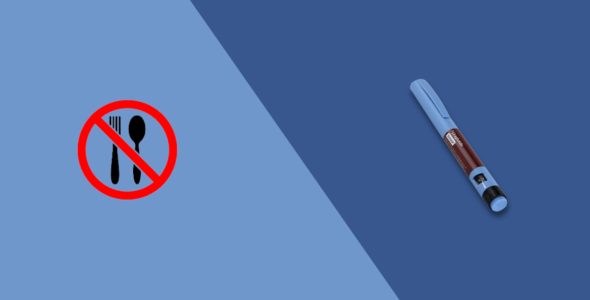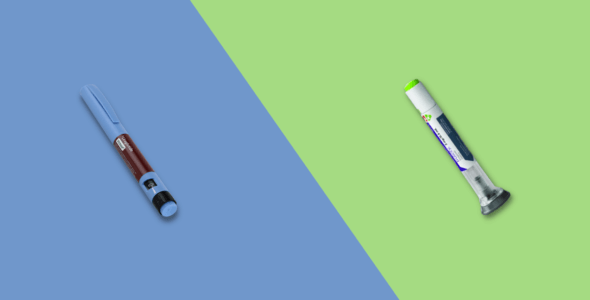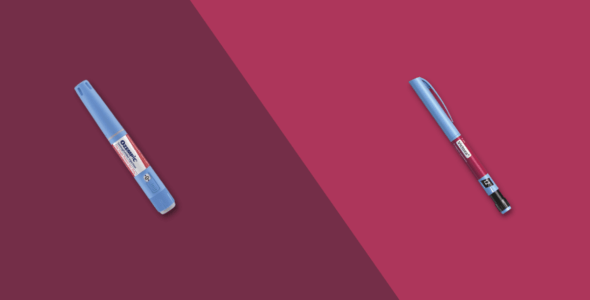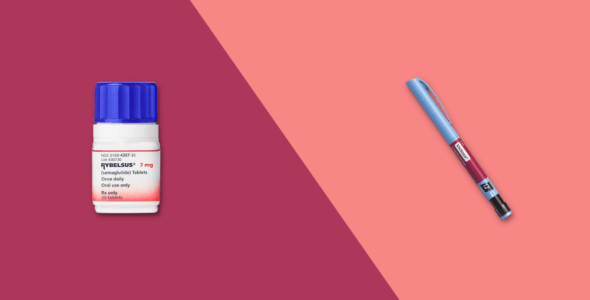Victoza alternatives for type 2 diabetes compared
Victoza is manufactured by Novo Nordisk. It has FDA approval to help control blood sugar levels in people with type 2 diabetes (adult-onset diabetes) and is usually prescribed when people can’t control their blood sugar through diet and exercise alone or if their diabetes medication isn’t effective.
Here, we will take a look at what Victoza is, what its used for, how it works, and what alternative treatments are available.
What is Victoza used for?
Victoza can be used instead of other diabetes medicine or alongside some diabetes medicines. Victoza (liraglutide) is used:
- As an adjunct to a reduced-calorie diet and increased physical activity to improve glycemic control in patients 10 years of age and older with type 2 diabetes mellitus
- To reduce the risk of serious adverse cardiovascular events in adults with type 2 diabetes mellitus and known heart disease
Victoza is not approved by the FDA to treat type 1 diabetes mellitus. Using Victoza may aid weight loss and help to reduce body weight. This may be especially useful in those patients also suffering from obesity.
RELATED: What is Victoza
How does Victoza work?
When you eat and digest food, sugar is released into your blood so it can be transported around your body. Your body absorbs the sugar out of your blood, returning your blood sugar to normal levels. People with diabetes struggle to control their blood sugar and often have high blood sugar levels (hyperglycemia). Over time this can cause a range of problems, including nerve damage and heart disease.
Victoza is classed as a glucagon-like peptide-1 (GLP-1) receptor agonist that binds and activates the GLP-1 receptor in your pancreas. GLP-1 is an essential hormone that helps manage blood glucose levels after you eat carbohydrates or fats. In type 2 diabetic patients, GLP-1 levels are decreased. By activating the GLP-1 receptor, Victoza increases the release of insulin from your pancreas, blocks the liver from making more sugar, and slows down the movement of food through your stomach.
What are the side effects of Victoza?
The most common side effects of Victoza in clinical trials include:
- Injection site reactions
- Nausea
- Gastrointestinal side effects – diarrhea, constipation, abdominal pain
- Low blood sugar (hypoglycemia)
- Headaches
- Anxiety
- Tremors
More serious side effects of Victoza include
- Inflammation of the pancreas (pancreatitis)
- Kidney and gallbladder problems
- Increased risk of thyroid tumors and thyroid cancer
Contact your healthcare provider for medical advice about any adverse effects you experience while taking Victoza. You can report your side effects to the FDA at 1-800-FDA-1088 or www.fda.gov/medwatch.
Victoza contraindications
You should not use Victoza if you:
- Are allergic to the active ingredient liraglutide
- Have had an allergic reaction to any of the other ingredients found in Victoza
- Have type 1 diabetes or diabetic ketoacidosis
Talk to your doctor before using Victoza if you:
- Have severe heart disease
- Have severe liver disease
- Have kidney failure, are on dialysis, or have any other kidney problems
- Have a severe stomach or gut problem
- Have inflammatory bowel disease
- Symptoms of acute pancreatitis (like a persistent, severe stomach ache)
- Have thyroid disease
- Are pregnant, or are planning to become pregnant
- Are breastfeeding, or are planning to breastfeed
Is there a cheaper version of Victoza?
Currently, there isn’t a cheaper branded version of Victoza, and Victoza is not available as a generic (generics are cheaper non-branded versions of branded medications). Alternative prescription drugs for Victoza, such as metformin, or glipizide, sulfonylureas such as glimepiride, or branded medication such as Jardiance, Invokana, or Byetta (exenatide) may be available cheaper than Victoza. How much these alternatives will cost will depend on how much you buy and the retailer you buy them from.
Another cheaper way to help manage diabetes is to change your lifestyle. Healthy eating and regular exercise help with weight loss and managing your diabetes, especially if you are overweight. Speak to your doctor for further information and medical advice.
Is Ozempic the same as Victoza?
Both are GLP-1 receptor agonist medications used to treat type 2 diabetes. They are given as an injection under the skin (subcutaneous injection) using a self-injecting pen device, and they work in the same way. Although Ozempic and Victoza are similar, there are key differences between them.
Ozempic contains a GLP-1 receptor agonist called semaglutide, whilst Victoza contains a GLP-1 receptor agonist called liraglutide. Semaglutide and liraglutide do work in similar ways, but they are not identical, and you may respond to them differently.
Ozempic can be used in adults 18 years of age and older, and Victoza can be used in adults and children 10 years of age and older.
The doses prescribed for each drug also vary. Ozempic pens can be prescribed in 0.25 mg, 0.5 mg, and 1 mg doses, whereas Victoza pens can be prescribed in pre-filled, multi-dose pens that deliver 0.6 mg, 1.2 mg, or 1.8 mg doses.
The frequency of Ozempic and Victoza dosing also differs. Ozempic is a weekly semaglutide injection, and Victoza is a daily liraglutide injection.
Are Trulicity and Victoza the same thing?
Victoza contains liraglutide, and Trulicity contains dulaglutide as the active ingredient, both of which are classed as incretin mimetics. Victoza and Trulicity are both given as injections under the skin to treat Type 2 diabetes mellitus in adults, along with diet and exercise.
Victoza can be used in patients as young as 10 years old and is also indicated to reduce heart attacks and stroke in adults with type 2 diabetes and heart disease. Victoza is given once a day, while Trulicity is given once a week. Both of these medications have very similar side effects and drug interactions.
Victoza and Trulicity have been directly compared in a clinical study with adult patients that have Type 2 diabetes. The patients in this study also took metformin along with Victoza or Trulicity for 26 weeks. It showed that both medications were equally effective in improving patients’ blood glucose levels.
RELATED: Victoza vs Trulicity
Which is better, Victoza or Saxenda?
Victoza and Saxenda are both injectable medications that contain liraglutide. There are differences in the conditions approved by the U.S. Food and Drug Administration (FDA) to treat and the doses used.
Victoza is indicated along with diet and exercise to treat type 2 diabetes in adults and children 10 years of age and older. It is approved to reduce the potential risk of heart attack and stroke in adults with type 2 diabetes and cardiovascular disease.
Saxenda is used with diet and exercise for long-term body weight management in adults with a body mass index (BMI) of more than 30 kg/m2 or a BMI higher than 27 kg/m2 in patients who also have high blood pressure and high cholesterol.
RELATED: Saxenda vs Victoza
Is Victoza gluten-free?
Victoza is classed as gluten-free. However, there have been reports of glucose intolerance to Victoza. Cases of glucose intolerance have been reported in patients over the age of 60. It is important to understand that there have only been 1 or 2 cases of glucose intolerance reported each year since 2013.
Is Victoza a generic drug?
Victoza is not a generic diabetes drug. It is the brand name for a drug containing liraglutide as the active ingredient. Currently, there is no generic alternative available for Victoza on the market.
How do I use Victoza?
You can use Victoza once a day at any time of the day, with or without food. Inject Victoza under the skin (subcutaneous) in your stomach, thigh, or upper arm. Rotate the injection site with each injection of Victoza to reduce your risk of cutaneous amyloidosis (lumps under your skin).
If you forget to take a dose of Victoza, skip it and take your next dose at the usual time. Do not take extra doses of Victoza. Call your doctor immediately for medical attention if you think you have taken too much Victoza.
Victoza can interact with other medications. This can change how Victoza and other medications work and can make side effects more likely. Tell your prescribing physician about all your drugs, including over-the-counter, vitamins, and dietary supplements.
What is the best substitute for Victoza?
There are many alternatives to Victoza for the treatment of Type 2 diabetes. These include medicines such as metformin, glipizide, Trulicity, Ozempic, Tradjenta, Invokana, Levemir, and many others. Which treatment is best for you will depend on you and the condition you are being treated for. Speak to your doctor about the alternative treatments available.
Can I get my Victoza for free?
Victoza is covered by most health plans, including Medicare and Medicaid. Check with your plan for more details.
How much does Victoza cost?
Victoza prices without insurance will vary depending on where you buy it, the number of injectable pens per pack, and the strength of the pens. For a pack of three injectable pens with 3ml doses, you can pay around $530.
Medically reviewed
A medical professional has reviewed this article.


Jamie Winn, PharmD
Jamie Winn, PharmD
Dr. Jamie Winn received his Doctor of Pharmacy in 2002 from the University of South Carolina College of Pharmacy, Columbia, SC. Jamie is a medical reviewer for NiceRx.







